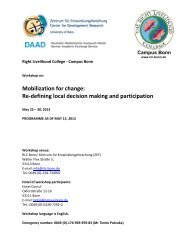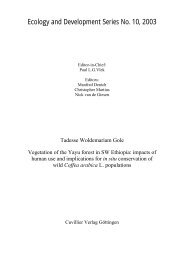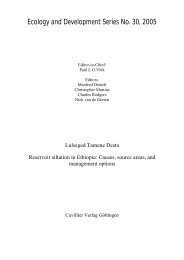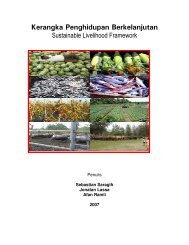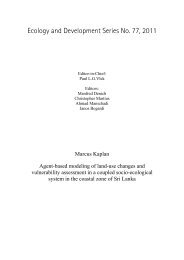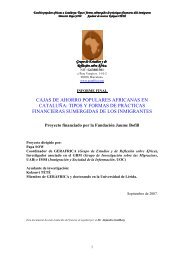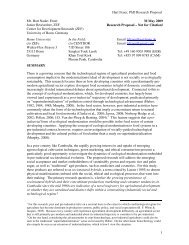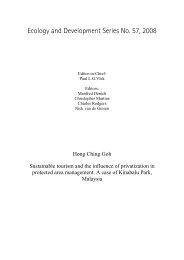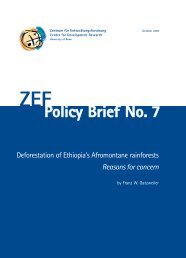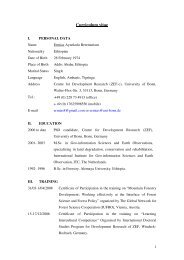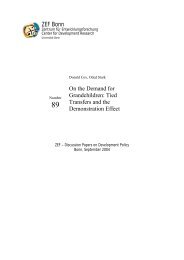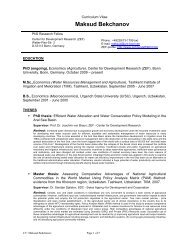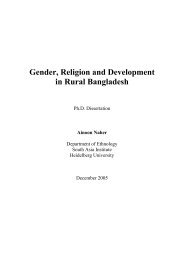Karuna Trust, Karnataka - ZEF
Karuna Trust, Karnataka - ZEF
Karuna Trust, Karnataka - ZEF
You also want an ePaper? Increase the reach of your titles
YUMPU automatically turns print PDFs into web optimized ePapers that Google loves.
Good and Bad Practices in Microinsurance<strong>Karuna</strong> <strong>Trust</strong>, IndiaFor the first two years, the premium for BPL members and scheduled castes/scheduled tribes(SC/ST) was fully subsidised by UNDP. Some groups (BPL non SC/ST) enjoyed partial (2/3)subsidies in the first year. The subsidised premium amount was transferred directly to NIC.The subsidized pilot scheme ended in 2005; now premiums have to be paid fully by theinsured clients. As NIC’s agent, <strong>Karuna</strong> <strong>Trust</strong> earns approx. 5% (Rs. 1 per policy issued) ofthe premium to cover its administrative costs. Since this amount is insufficient, <strong>Karuna</strong>utilizes funds from other activities to cover the remaining costs.Convinced by the social character of the scheme, NIC agreed to a maximum claim ratio of150% and cross subsidizes this insurance activity. This cap will be subject to regular review.In case the scheme is expanded to other districts and the numbers of insured growsignificantly, NIC might modify this commitment.2.4 Risk Management Products<strong>Karuna</strong> <strong>Trust</strong> offers two risk management products:1. Health insurance should protect households from falling into poverty due tohospitalisation. By offering compensation for wage loss when hospitalised, <strong>Karuna</strong>creates an incentive to seek care early. The additional compensation for wage loss incase of surgery (lump sum of Rs. 500 ($11)) is an incentive for the patient to recoverat home for ten days after leaving the hospital. <strong>Karuna</strong> wants to ensure that beingforced to work too early after surgery does not decrease long-term productivity.2. Besides the insurance, <strong>Karuna</strong> <strong>Trust</strong> offers a loan fund to its microfinance groups,which is intended to help in case of outpatient treatment (see Box 2.2).Box 2.2 Health Revolving FundOutpatient care is not free of cost – even in public facilities where it is supposed to be free.<strong>Karuna</strong> <strong>Trust</strong>’s beneficiaries report about payments of Rs. 50 to 100 to doctors in publicfacilities when seeking care. Additionally, drugs often have to be purchased from privatepharmacies as they are not available in the public facility (and for OPD not covered in<strong>Karuna</strong>’s insurance programme). Therefore most beneficiaries prefer consulting a privatedoctor where the drugs needed are covered in the doctor’s bill of Rs. 50 to 100.To respond to this demand, <strong>Karuna</strong> <strong>Trust</strong> and UNDP set up a “Health Revolving Fund” whichis administered through the microfinance structure of <strong>Karuna</strong> <strong>Trust</strong>. All 245 of <strong>Karuna</strong>’sSHGs in T. Narsipur were allocated Rs. 5,000 as additional funds. These funds can be used inaddition to the SHGs’ own funds for health related issues. The CDA Federation controls theuse of these funds as the purpose for loans has to be stated with each loan given to a member.A total of Rs. 1,250,000 ($28,400) has been transferred to the SHGs’ bank accounts.2.5 Profit Allocation and DistributionThe scheme is not designed for profit. All funds are transferred to NIC; in case of a positivebalance, the profit would be with NIC.20



